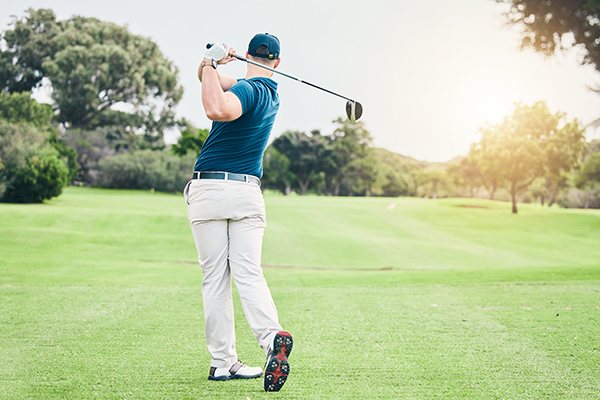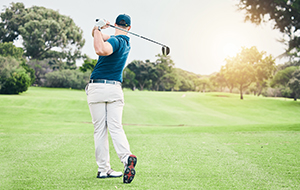
May marks arthritis awareness month, a reminder to take care of your joints to better health and wellness. As nice weather approaches, nearly 25 million Americans will return to the golf course. Many golfers can experience joint pain on the golf course, typically resulting from arthritis. Implement these tips this summer to enjoy your game.
Warm-Up and Stretch: Although golf seems like a laid-back, leisurely sport, you need to incorporate a proper warm-up. A good warm-up and stretch gets the blood flowing throughout your body and helps promote synovial fluid around joints. Warm muscles, ligaments, tendons, and joints are essential to have a full range of motion. Regular stretching has been shown to help reduce stiffness and alleviate joint pain.
Appropriate Exercises: Incorporate strength training exercises, particularly focusing on your core. Increased muscle strength provides stability to the joints and muscles. A strong core helps stabilize your golf swing and improves your overall power. Greater core stability lessens the chances of injury and can help prevent joint pain. Power and momentum in your golf swing are generated from the lower extremities. Strong abdominals, legs, and glutes can help protect your back while you swing.
Technique Adjustments: The goal of adjusting your golf swing is to ensure that you are putting the least amount of stress on your joints as possible. Consider working with a skilled golf coach or physical therapist to improve your swing. Modifications may include adjustments regarding your posture, stance, weight distribution, and backswing. This is different for each individual as each golfer has a unique swing. Poor technique can irritate the joints causing inflammation, which can initiate arthritis flares.
Equipment Modifications: Golf experts can give you recommendations regarding the best choice of equipment specifically for you. Consider using a lightweight club made from graphite. Opt for longer clubs and tees so you can reduce the amount of bending down. Golfers who suffer from arthritis in their hands should look for clubs with an oversized grip to help reduce the stress on their fingers and hands. Taping the grip or using gloves can also be beneficial. Proper shoes are crucial for golfers who suffer from joint pain in their feet. Choose a shoe with adequate cushion and a wide toe box so the feet have room to spread.
Pain Management: Pain management can include a variety of different approaches. Talk with your doctor about which options may provide you with the best pain relief. For some people, over-the-counter NSAIDs are sufficient. These nonsteroidal anti-inflammatory drugs like ibuprofen, aspirin, and naproxen reduce inflammation and pain. Injections and regenerative orthobiologic treatments, like PRP and stem cell therapy, can also be an effective treatment for joint pain.
Don’t let your arthritis pain affect your golf swing this summer. The New Jersey Orthopaedic Institute offers many effective non surgical sports medicine solutions for joint pain, including orthobiologics and minimally invasive surgical solutions.
AUTHOR:
Vincent K. McInerney, MD, is Board Certified by the American Board of Orthopaedic Surgery and a Fellow of the American Academy of Orthopaedic Surgeons (AAOS). He is currently the longest standing committee chairman of the Medical Society of New Jersey's (MSNJ) Committee on Medical Aspects of Sports. He has served as team physician and medical coordinator for the United States Olympic Team Handball Federation, Colorado Springs, Colorado. Dr. McInerney has received the Physician of the Year Award for the Eastern Athletic Trainers Association, Physician of the Year for the Passaic County Medical Society, Educator of the Year Award at Seton Hall University, an active member of the Harvard Medical Alumni Association.





